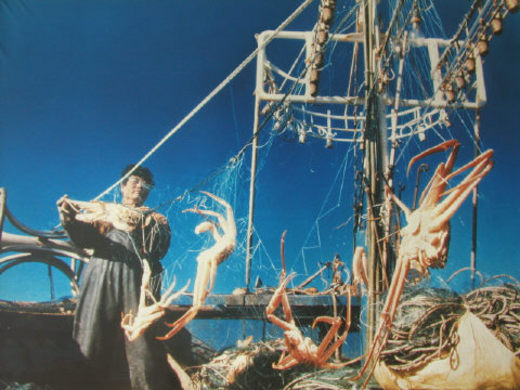 |
|
A fisherman is catching snow crabs.
|
Self-regulated fishing groups aim to protect environment, as well
A national convention for fishermen that are members practicing self-regulatory management took place at Seoguipo, Jeju Island on November 22-23. About 500 fishermen participated. Speaking of the potential for individual fishermen to make a living, Jang Deok-sun, chairman of a " self-regulated fishing community" in Jukbyeon, Uljin, North Gyeongsang Province, said that the fishermen belonging to the community earn about 40-50 million won (US$40-$50,000) per household by catching snow crabs. Such high performance was the result of a shortened fishing period, an enlarged net knot and a shortened net length. As snow crab catches decreased rapidly in size in the first part of the new millennium, some fishermen seeking to continue to catch the crab began to manage operations, forming a 41-member, self-regulated snow crab fishing community in 2004. They then halved the number of nets and enlarged the size of the net knots they used from 24 to 27 centimeters. Moreover, from last year, they enforced a self-imposed extension of the closed season until December 15, from the date of November 1 set by the government. Owing to these efforts, catches of snow crab increased slightly in 2005, and so far this year, the fishermen have caught 260 tons. Just two years prior, the yield was only 170 tons. The membership of this self-regulated fishing group has increased to 53, and now they are testing environmentally-friendly nets, which automatically disentegrate if they are left alone in the water for a long time.In addition, an independent fishermen's movement to save fishing grounds that have been ruined by reckless and illegal fishing and destruction of habitat is gaining popularity nationwide. Currently, the number of participants of the self-regulation community launched by the Ministry of Maritime Affairs and Fisheries in 2001 stands at 34,000, or 22 percent of the entire fishing industry. They are widely considered to be taking the first steps toward saving the South Korean fishing industry. Attempts to voluntarily reduce catches are often met with resistance from fishermen, but leaders in the community have produced favorable results by persuading them to accept the catch limits. They set rules about the size of fish and shellfish that can be caught, as well as fishing days and hours. Those violating the rules are fined. The fishermen also have come up with various ideas to increase their income, such as catching anchovies by using traditional fishing methods, or growing abalones by building artificial "homes" for them in the sea. Please direct questions or comments to [englishhani@hani.co.kr]






